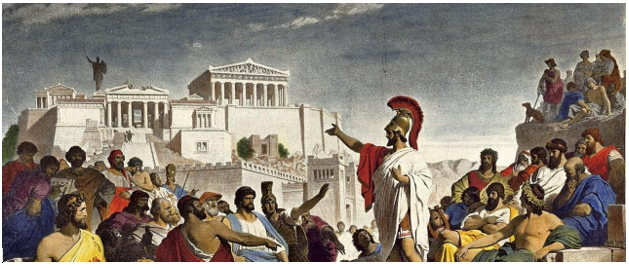 In History of the Peloponnesian War, written in the fourth century BC, Athenian historian and military general Thucydides recounts Pericles’ funeral oration detailing the earliest casualties of the war with Sparta. Pericles delivers a rousing speech on the greatness of Athens that touches on several themes, including meritocracy and equality before the law.
In History of the Peloponnesian War, written in the fourth century BC, Athenian historian and military general Thucydides recounts Pericles’ funeral oration detailing the earliest casualties of the war with Sparta. Pericles delivers a rousing speech on the greatness of Athens that touches on several themes, including meritocracy and equality before the law.
First and foremost, Pericles emphasizes the freedoms exercised and defended by citizens of the first democracy:
The freedom which we enjoy in our government extends also to our ordinary life. There, far from exercising a jealous surveillance over each other, we do not feel called upon to be angry with our neighbor for doing what he likes, or even to indulge in those injurious looks which cannot fail to be offensive, although they inflict no real harm.
Later in the speech Pericles returns to a similar theme:
We throw open our city to the world, and never by alien acts exclude foreigners from any opportunity of learning or observing. Although the eyes of an enemy may occasionally profit by our liberality, we trust less in system and policy than to the native spirit of our citizens.
By the end of the speech, most anyone with a pulse would be ready to don bronze armor and run through a wall of marble for Athens.
Sadly, the story does not end there. The war drags on for decades. Pericles, among many others, dies in a plague. The defects of first democracy became increasingly apparent. Anger and demagoguery arise while virtue and discernment decline.
Later in the same history, the leaders of the island city Melos plead with representatives of Athens to be allowed to remain neutral in the war. In their appeals, the leaders remind the Athenians of their ideals and their reputation, and how destroying them would damage and dishonor both.
The Athenians reply:
The strong do what they can, the weak suffer what they must.
This didn’t end well for Athens, and it seems to be a useful caution for us today. Polarization and anger have grown in our democracy, and schooling lies at the epicenter. People have plenty of reasons to feel angry, and many feel that districts have imposed what they regard as inappropriate curriculum on their children without their consent.
Virtual platforms like Zoom gave them a first-hand look into classrooms, and many parents did not like what they saw. A mood has grown along the lines of, “Since someone’s preferences are going to be imposed, I’m going to make them mine.”
This, however, leads to a dark place, and is contrary to the ideals of the choice movement.
Far from the ideal of the shining democratic city on a hill described by Pericles, school district democracy is broadly rigged and is far more about the preferences and interests of those who engineer school board majorities than the preferences and interests of those paying the bills.
Sadly, a number of factions have indeed worked their way into district curricula without any meaningful democratic asset of the governed. But ultimately, this not just about them; it also is about us. Will the choice movement continue to embrace the liberality and pluralism that has long been at the core of our project?
Support for family autonomy and curriculum bans do not belong in the same mind. People are justifiably angry about having what they view as objectionable material imposed upon them, but both we and they should feel profoundly reluctant to deny such an education to others who desire it.
If you can do that to them, what will stop them from doing it to you?
Team Pericles or Team Melos? Put me down for #TeamPericles.



It’s not Team Pericles vs. Team Melos. It’s Team Pericles vs. Team Ruthless (but Honest) Athenian Imperialists. The Melians were pretty much minding their own business.
I read Thucydides’ Melian Dialogues in 12th-grade Great Books class. The Vietnam War was on then. Now, it’s Russian “peace keeping” in Ukraine, the old family stomping grounds until my great-grandparents made it to America.
Yes “TeamMelosSlaughter” would have been more accurate.